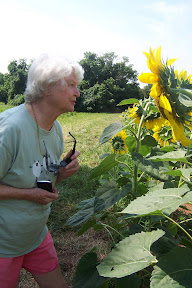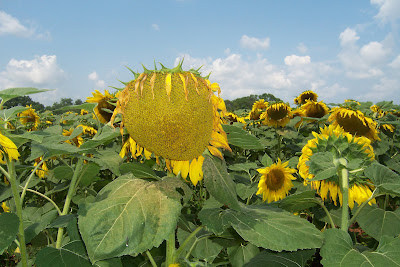When does science become significant?
By Peggy Ashbrook
Posted on 2009-07-28
 Math and Science in Preschool: Policies and Practice, a National Institute for Early Education Research (NIEER) Preschool Policy Brief, says that teachers usually do not plan and support science and math learning in pre-K. How does that happen when young children are so curious about the world and so interested in who has more, is taller, or older?
Math and Science in Preschool: Policies and Practice, a National Institute for Early Education Research (NIEER) Preschool Policy Brief, says that teachers usually do not plan and support science and math learning in pre-K. How does that happen when young children are so curious about the world and so interested in who has more, is taller, or older?
Some preschool teachers bring their own curiosity into play, in school and out, such as early childhood teacher Sue Hewitt who went out of her way to see a novel (for her—and me!) sight—a big field of sunflowers. Because science activities are full of possibilities for math and language development, they can be the basis for across-the-curriculum learning. Sue talked about how investigating a milkweed seed pod with her class of two-year-olds included sharing a history of children collecting the pods during World War II to use in making life vests for service personnel, and, upon opening the pod, the discovery of how the successfully the seed is dispersed—in the classroom! I’m sure that gave the children a lot to talk about!
 Does anyone have a story to share about a science activity that became the vehicle for language development or math operations?
Does anyone have a story to share about a science activity that became the vehicle for language development or math operations?
Or about a moment when you realized that teaching science in your classroom is essential?
Peggy
Disclaimer: The views expressed in this blog post are those of the author(s) and do not necessarily reflect the official position of the National Science Teaching Association (NSTA).


